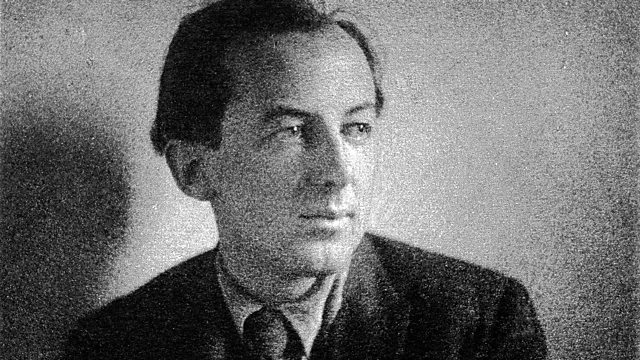
Musical Pioneer
Donald Macleod details Henry Cowell's concert appearances, which were not without controversy.
During the 1920s Henry Cowell becomes an international concert pianist yet his music continues to divide opinion.
Cowell's influence on American music has been immense, spread not only through more than 900 compositions of infinite variety, but through his many lectures, articles and recordings. One of the first advocates for World Music, his breadth of musical and cultural appreciation inspired pupils including John Cage and Lou Harrison. Cowell was tireless in his support of other contemporary composers, notably including Charles Ives and Ruth Crawford Seeger. He founded the New Music Society of California and ran the Pan American Association of Composers for much of their existence as well as founding the quarterly publication New Music.
Cowell's life is as unique as his music. Born in 1897 in Menlo Park, California his childhood was punctuated by periods of extreme poverty, which he alleviated by finding various means to earn money, including working as a cowherd and as a wildflower collector. Largely home schooled, his education was derived from his own natural curiosity. As a consequence Cowell acquired an encyclopaedic knowledge in diverse fields, yet he was unable to spell or do arithmetic with any degree of proficiency. A chance encounter with Stanford University psychologist Lewis Terman led to the recognition of his exceptional mind, and to some funding for a more formalised education, including studying with Charles Seeger at Stanford. Cowell carved out a career as an international concert pianist, presenting his own avant-garde pieces, despite the occasional riot and character assassinating reviews. Cowell's musical activities were interrupted in 1936. Then in his late thirties, Cowell pleaded guilty to a morals charge and spent four years in San Quentin prison. It was due to the efforts of his step-mother Olive and the folk-music scholar Sidney Hawkins Robertson, who later became his wife, that he was released on parole in 1940. Two years later he received a pardon from the California governor, which allowed him to take up a position within the US Office of War Information and later on for Cowell to receive several awards and accolades in respect of his outstanding contribution to music.
Cowell's concert appearances were not without controversy. European modernists like Schoenberg and Bartok took him seriously, but his use of tone clusters and direct manipulation of the piano's strings scandalized audiences and critics alike, a situation that made him both a figure of some notoriety and highly in demand. Donald Macleod is again joined by Joel Sachs, conductor, pianist, professor at Juilliard School and author of a comprehensive biography of Henry Cowell.
Polyphonica
Continuum
Joel Sachs, conductor
The Sleep Music of the Dagna
Joel Sachs, piano
Tiger
Joel Sachs, piano
Irish Suite for String Piano and Small Orchestra
Continuum
Cheryl Seltzer, piano
Joel Sachs, conductor
Quartet Euphometric
Colorado Quartet
Julie Rosenfeld, violin
Deborah Redding, violin
Francesca Martin Silos, viola
Diane Chaplin, cello
Synchrony
San Francisco Symphony
Michael Tilson Thomas, conductor.
Last on
Music Played
-
![]()
Henry Cowell
Polyphonica
Ensemble: Continuum. Conductor: Joel Sachs.- Naxos: 85591912.
- 18.
-
![]()
Henry Cowell
The Sleep Music of the Dagna
Performer: Joel Sachs. -
![]()
Henry Cowell
Tiger For Piano
Performer: Joel Sachs. -
![]()
Henry Cowell
Irish Suite for String Piano and Small Orchestra
Performer: Cheryl Seltzer. Ensemble: Continuum. Conductor: Joel Sachs.- Naxos: 85591912.
- 19.
-
![]()
Henry Cowell
Quartet Euphometric For Strings
Ensemble: Colorado String Quartet.- Mode: 72/73.
- Mode.
- 3.
-
![]()
Henry Cowell
Synchrony For Orchestra
Performer: San Francisco Symphony. Conductor: Michael Tilson Thomas.- SFS MEDIA : 821936-0056-2-0.
- SFS MEDIA.
- 1.
Broadcasts
- Tue 20 Oct 2015 12:00����ý Radio 3
- Tue 20 Oct 2015 18:30����ý Radio 3
Beethoven Unleashed – the box set
What was really wrong with Beethoven?
Composers A to Z
Who knew? Five eye-opening stories from Composer of the Week
Five reasons why we love Parry's Jerusalem
What is the strange power of Jerusalem which makes strong men weep?
A man out of time – why Parry's music and ideas were at odds with his image...
The composer of Jerusalem was very far from the conservative figure his image suggests.
Composer Help Page
Find resources and contacts for composers from within the classical music industry.





